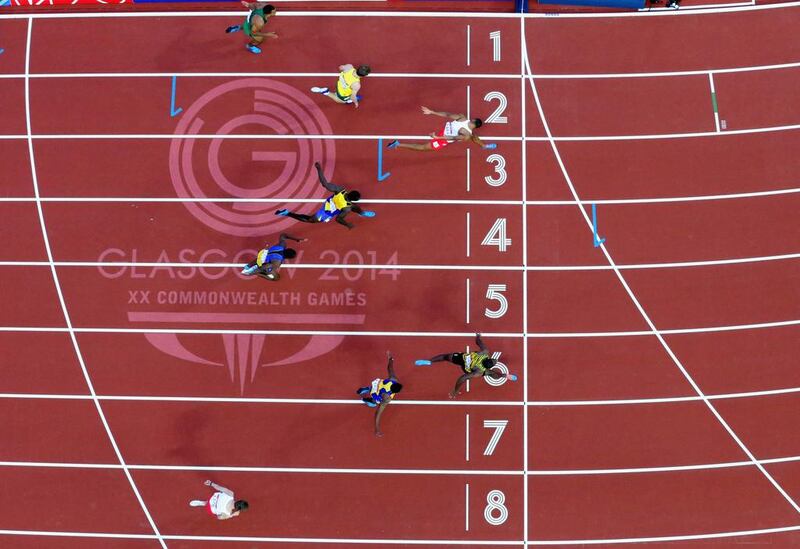Two years ago, London was awash with British flags. As athletes and spectators descended on the capital for the 2012 Olympic Games, all things British were very much in vogue.
Now it is Scotland’s turn to soak up the feel-good factor that comes with hosting a major sporting event. The Glasgow 2014 Commonwealth Games, which end on Sunday, have seen Scotland’s biggest city welcome competitors from 71 countries and territories including India, South Africa, Australia, the Cook Islands, Barbados and Bermuda.
The largest sporting event ever to be hosted by this constituent country of the United Kingdom, the Games also fall less than two months before Scots go to the polls to decide their political future.
The referendum on Scottish independence, to take place on September 18, is the biggest constitutional challenge to the three-century-old union between Scotland and England in modern times.
It is unlikely that many Scots have given a second thought to the entirely non-violent manner in which this contest is being waged – in contrast, say, to many of the political upheavals in the Arab world in recent years.
The Scottish people have been hearing about the pros and cons of independence on a daily basis since the Scottish National Party won outright control of the Scottish Parliament in 2011.
The bitter contest between the pro-independence Yes Scotland and pro-union Better Together camps has regularly generated more heat than light. Nevertheless, the Commonwealth Games will surely give cause for some pre-referendum jitters in the pro-UK camp, which has seen its lead in the polls come under sustained attack in recent months.
While Scotland participates in individual sports like football and rugby on the world stage as a nation in its own right, the Commonwealth Games is the only major multi-sport event where it does likewise – and it is certainly revelling in the joy of it. Walk the streets of Glasgow and Saltires (Scottish flags) abound. In the swimming pool, on the judo mat, in the cycling velodrome, Scottish athletes are triumphing and weeping on the gold-medal podium as their national anthem, Flower of Scotland, plays.
It wasn’t so different during London 2012 when Scottish sportspersons – participating under the British flag – took genuine delight in adding to the medal tally of Team GB. Here, and in the two years since that successful Olympics, pro-union politicians both north and south of the Scotland-England border have driven home the significance of a UK working in harmony – highlighting, for example, the achievements of Scots-born tennis star Andy Murray, who won Olympic gold in British colours.
With union flags at a minimum in Glasgow right now, Scotland – and Scotland alone – is demonstrating the sort of nationwide confidence and energy that will delight the Yes campaign. Not so, I imagine, Better Together, which has spent the best part of two years attempting to undermine Scotland’s self esteem by predicting everything save for a plague of frogs and locusts in the event of the country going it alone for the first time since 1707.
Far from operating in a vacuum, however, Scotland’s struggle with its constitutional future has also put Europe’s other independence movements under the spotlight. Those in Flanders, Belgium and Veneto, Italy, are less well known but the campaign by the regional government of Catalonia, north-east Spain, has had quite a high profile. Despite enjoying a wide degree of autonomy from the central government, the Catalan authorities plan to hold a referendum on full independence this November.
While Scotland successfully negotiated an agreement with the UK government to hold its referendum, Spanish MPs overwhelmingly rejected a similar request from Catalonia earlier this year. Spain’s prime minister, Mariano Rajoy, declared the poll “illegal”.
Speaking to the BBC this month, Spanish newspaper columnist Jose Ignacio Torreblanca noted that there was genuine good will on all sides in Scotland, but that in Spain there was a political standoff that seemed more akin to a Middle East regional upheaval.
“Whether [Scotland] votes yes or no doesn’t really matter – the fact a referendum has been granted and is going ahead is seen as hugely significant. What remains to be seen is whether the Catalan government will merely use the threat of a referendum as a tactical tool – or whether they will go through with it, which would mean facing sanctions from Madrid.”
That the Commonwealth itself is, for many observers, an outdated relic of the once all-embracing British Empire, will worry few in Scotland, which, so used to glorious failures on the football pitch, is more than holding its own in the Commonwealth Games. Whether that will have the inspired effect that Yes campaigners hope for is a moot point.
With the conclusion of the Games, normal service will be resumed – and the referendum campaign will begin again in earnest.
Whatever the result, one thing is clear: the Scotland that will emerge from this debate will be an altogether more potent force than the one that began this journey. That was not the intention of No campaigners when the contest began, but it is true all the same.
If Scotland’s athletes at the Games have shown me anything, it is an absence of fear that, from the referendum ballot box and beyond, can only be a good thing for a country that is already making giant political waves far outside its borders.
Alasdair Soussi is a freelance journalist who covers the Middle East and Scottish politics
On Twitter: @AlasdairSoussi





